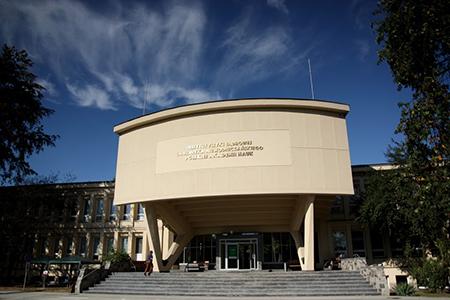The Henryk Niewodniczanski Institute of Nuclear Physics Polish Academy of Sciences
Institute

Institute of Nuclear Physics
ul. Radzikowskiego 152
31-342 Krakow
Poland
+48 12 662 8000

Institute of Nuclear Physics
ul. Radzikowskiego 152
31-342 Krakow
Poland
+48 12 662 8000
The Institute carries out basic and applied research in physics, with emphasis on nuclear physics. This research is aimed at explaining the structure of matter from microscopic to cosmic scales, through experiments and/or application of theoretical methods. Our activity extends into interdisciplinary research in a range of related fields and also stimulates technology transfer to the industry and to spin-off companies.
We are deeply involved in the LHC experiments at CERN:
- the ATLAS experiment, searching for new phenomena in the proton-proton collisions which could explain origin of the mass of particles and solve the cosmological problems of the Dark Matter and Dark Energy; our studies include the search for the Higgs particle and signs of superymetry, but also analysis of PbPb collisions
- the ALICE experiment, focused on heavy ion collisions (PbPb) and studying the properties of the Quark-Gluon Plasma - matter at extreme conditions similar to those present during an early stage of the evolution of our Universe
- the LHCb experiment, analyzing production and decays of particles containing beauty quarks, which tries to explain why in our Universe there is more ordinary matter than antimatter;
The study of elementary particles is performed also in the Belle experiment in Japan and in neutrino experiments ICARUS and T2K. The properties of cosmic rays are investigated in the Pierre Auger experiment.
There are also several groups analyzing interactions of nuclei at lower energies, applying various techniques in condensed matter research or performing interdisciplinary studies in medical physics, nano-materials engineering, environmental physics, dosimetry, radiation and environmental biology, biophysics, nuclear geophysics, radiochemistry, and econophysics.
Educational activities include the International Post-Graduate Course at IFJ with over 80 students from universities of several countries, courses given by the employees of the Institute at cooperating universities, specialized seminars as well as advanced laboratory practice on-site.
The Institute is also involved in the medical studies focused on treatment of cancer, especially in the most sensitive organs like the eyes. At the Institute a facility with a 230-250 MeV proton accelerator for the National Center for Hadron Radiotherapy is under construction.
guided tours through chosen laboratories in the Institute for pupils and students
"Open day" at the Institute
popular talks and exhibitions at Festivals of Science
IFJ outreach pages(in Polish)

